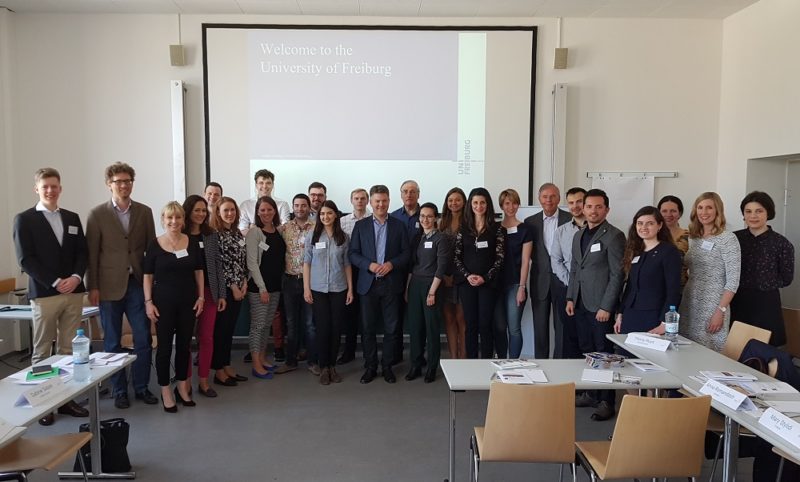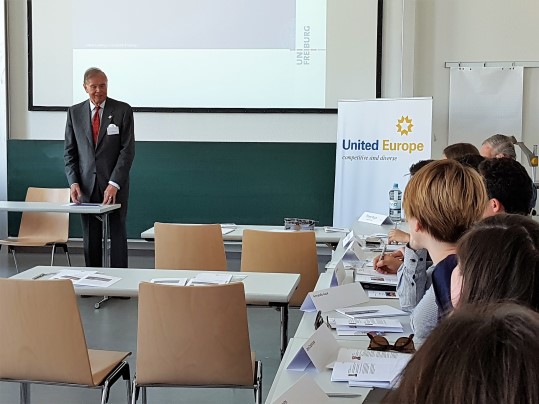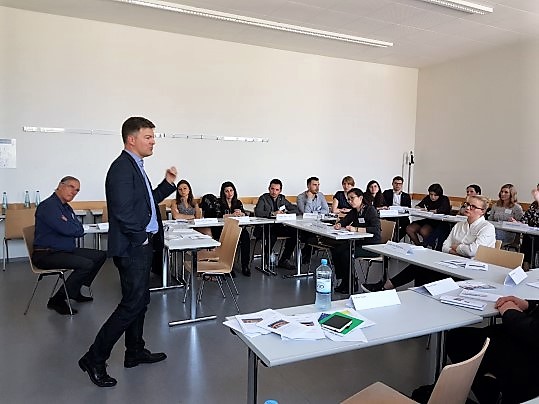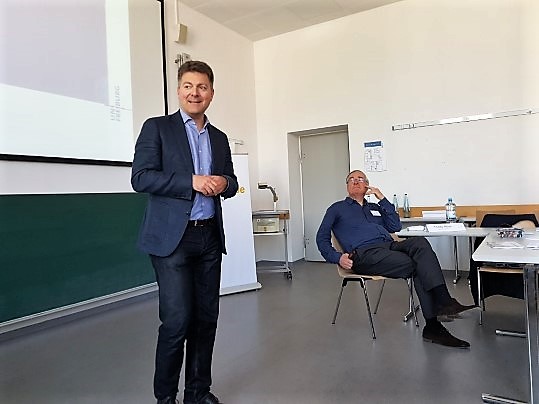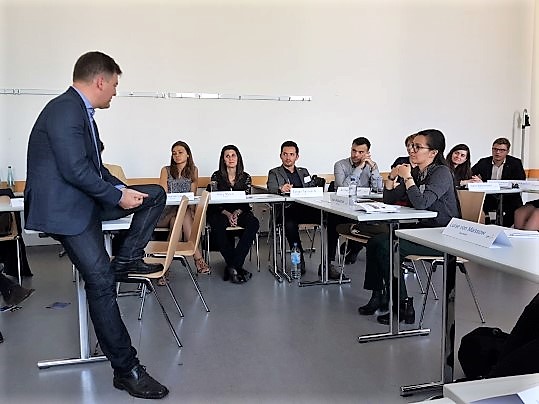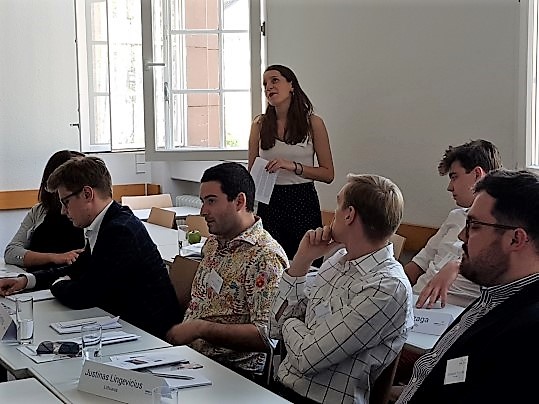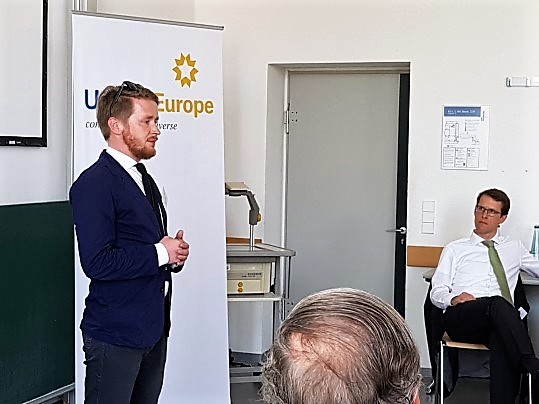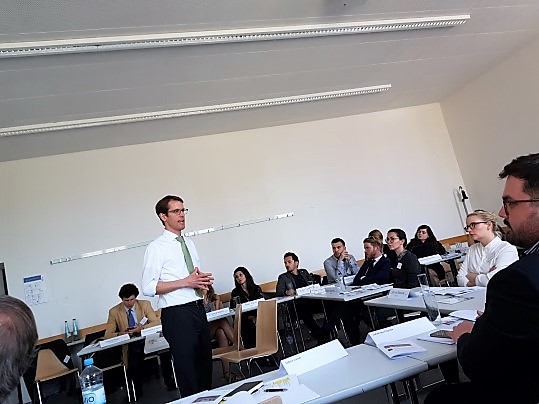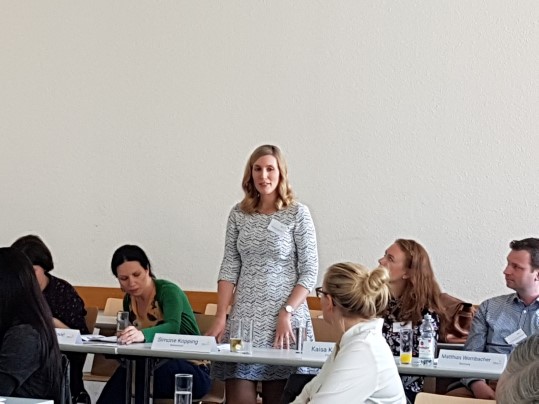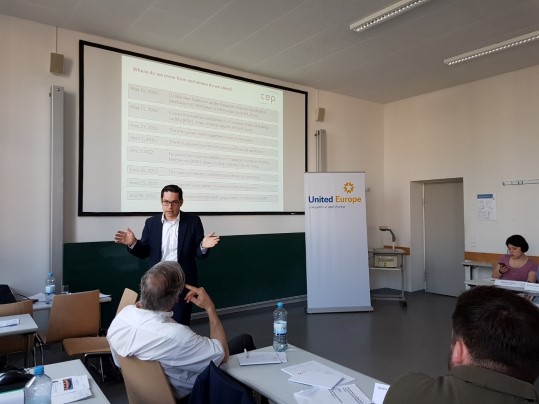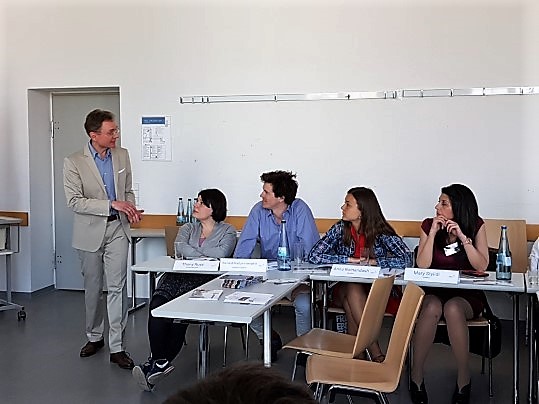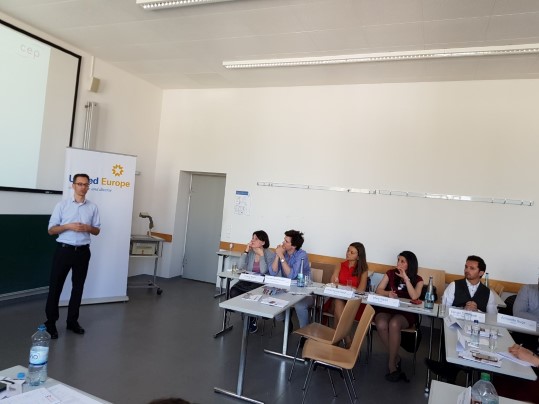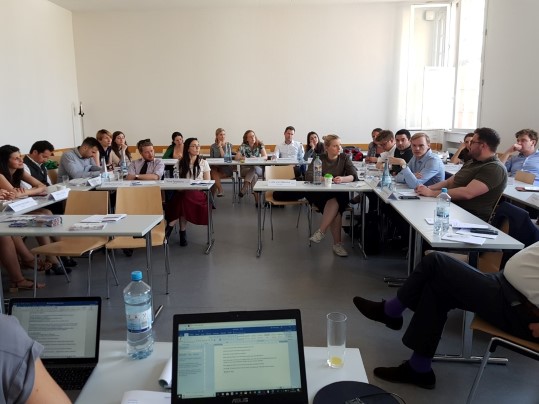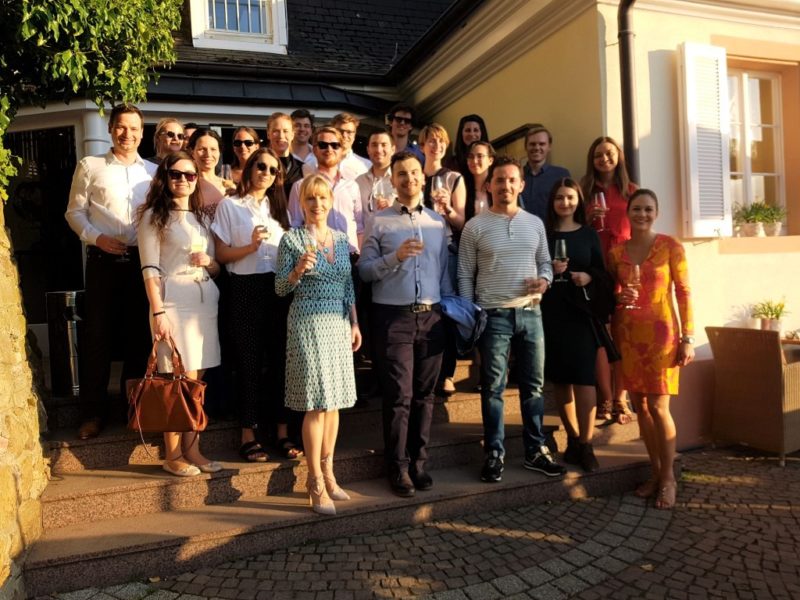Under the topic “Understanding Europe”, United Europe invited 23 outstanding young Europeans from 18 nations to a Young Professionals Seminar from 20th to 21th April, 2018, to Freiburg im Breisgau, Germany.
The welcome speeches were given by United Europe’s Vice President Thony Ruys and Prof. Dr. Horst Weitzmann, who generously supported the seminar at the famous Albert Ludwigs University in Freiburg. The workshops took place in cooperation with the Wilfried-Guth-Stiftungsprofessur für Ordnungs- und Wettbewerbspolitik and the Centre for European Policy (cep). The cep is the European-policy think tank of the non-profit foundation Stiftung Ordnungspolitik.
The seminar started with an interesting impulse given by Dr. Andreas Schwab, Member of the European Parliament. He described his job and tasks as Member of the Bureau of the EPP-group and coordinator in the Committee on the Internal Market and Consumer Protection in Brussels.
Then, he vividly explained how EU’s legislation works. He said: “In European politics it’s not about getting right, but to get a majority”. In Schwab’s eyes, the necessity to convince other MEPs from other parties in order to get a majority, is a very positive aspect of the job as a Member of the European Parliament. According to Schwab, the work in the European Parliament is based on the idea of finding a compromise in the committee. “In order to move forward you have to find a common position. However, at the end, extreme right and extreme left parties always vote against”. Being asked what the best way is to cope with cultural differences in European politics, he replied that “all that counts is a valid non-biased analytical system based on numbers and facts.” Moreover, Schwab finds that as a politician “you have to listen to different interest groups with very divergent positions.” Being asked about France’s ideas to reform the EU, he fully agreed to President Macrons idea of defending national sovereignty only by pooling it in a “European sovereignty”. At the end, Schwab called for common European standards: “In almost all EU countries there are good minimum standards. What we need in Europe is one common standard particularly for consumer rights.”
The seminar continued with a workshop by Urs Pötzsch, Policy Analyst at the cep. Pötzsch’s lecture on “Brussels at work – EU institutions and law-making” gave a very good introduction to the EU’s institutional structures and decision-making processes. In the first part, the participants took a closer look at the main EU institutions, in particular the Parliament, the Council and the Commission. The group learnt about the different tasks of these institutions, identified their institutional interests arising from their respective composition, analyzed the internal structures of the institutions and inter-institutional relations and discussed current topics like the “Spitzenkandidaten” process. In the second part, Pötzsch took the participants through various stages of the law-making process, from the Commission’s proposal to the “trilogue”, pointed out to the role of national parliaments and the relevance of comitology (process by which EU law is modified or adjusted).
The second day started with a workshop on “The Euro crisis” by Dr. Matthias Kullas, Head of Economics & Fiscal Policy at cep.
He explained the causes and origins of the banking and sovereign debt crisis that turned into an economic crisis. Now, seven years after, the Eurozone as a whole looks healthy and stable; however, the EU Commission still sees a need for reform in the Eurozone. The EU Commission has correctly recognised that, in spite of the positive headlines, the Eurozone must be further stabilised because there is still a lack of convergence between the Eurozone countries, which is essential for reducing the pressures in the Eurozone. Greece, France and Italy, for example, have already been showing below average or even negative GDP growth rates for several years.
After having analyzed the roots of the Euro-crisis, a vivid discussion started about the measures that have been taken to overcome the crisis. The highly heterogeneous background of the participants stimulated a fantastic debate about different approaches to cultural clashes.
The third workshop was on “Energy and Climate Policy”, led by Dr. Götz Reichert, Head of the Energy, Environment, Climate and Transport department at cep. He presented the essential features and conflicts of today’s EU energy and climate policy; moreover, Reichert explained the search of European states for common solutions to energy issues which had already been a major impetus for European integration since the early 1950s. Today, ensuring a secure energy supply at affordable prices while at the same time reducing CO2 emissions are the key challenges of the European energy and climate change policy. To this end, the European Union aims at creating an internal energy market, promoting energy efficiency, supporting renewable energies and interconnecting energy networks across borders. The participants discussed various EU instruments – ranging from standards for energy-efficient products to the EU Emissions Trading Scheme. The recent policy reforms, which have been the subject of fierce debates in Brussels, have revealed the different interests of Member States, businesses and environmentalists.
The fourth and last workshop was on “Quo vadis, Britain?”. Dr. Bert Van Roosebeke, Head of Department at cep, inspired the participants to a vivid discussion about the Brexit. Having one British-Irish and one British young professional among the YPS, the participants got a very close insight to what it actually means when a member state has decided to leave the European Union. Van Roosebeke explained the unprecedented legal, economic and political challenges both the EU are facing currently. The group discussed the economic impact of Brexit, the sequence of the negotiation process as well as the importance and difficulties of the transition phase in Brexit. Finally, Van Roosebeke presented the possible nature of the future, permanent relations between the EU and UK (as a third country, i.e. not member of the EU). The participants assessed whether the European economic area, the Ukraine-treaty, the EU-Switzerland treaties or a CETA-like trade agreement can proof as an example to future EU/UK-relations. Of course, the group also discussed if the Brexit is reversible. The participants concluded on the assumption that by the end of the day, a possible new referendum is not a legal but a political question.
A big discussion point was the EU’s political decision-making process. How can we as citizen raise the voice and contribute to Brussel’s decision-making process? Would it be better if EU’s legislation would become faster? There were many different opinions whether European legislation process lacks transparency. How efficient is EU bureaucracy (apparently by using only 6% of its general budget the EU parliament is more efficient than many other national parliaments). Definitely there was the call for more simplification. People want to get fast responses. The participants exchanged lots of pro’s and con’s around the beauty and the pain of consensus, compromises and the ultimate need for finding a common position. This is the crucial part of the complicated political decision-making process in Europe. The participants finally agreed on the call for increasing the awareness for EU subjects among Europeans.
Debating the current problems of Europe, participants agreed on the fact that the EU is lacking the backing of the people. Often proposals have a good intention, that is not visible any more when it comes to implementation. For understanding Europe, communication is key: Each law should be checked on the value added to the European people. Then, the EU should clearly talk about the positive aspects of a specific law or simply about the benefit of being part of the European community. Additional means for elucidating information trips to Brussels to show people how Europa actually works, could be an option, too.
Intrigued by the workshop about the Euro crisis, another important question was raised: what needs to be changed in Europe, in order to be prepared for immediate action and not always just acting as the fire brigade, if a crisis pops up? It’s also a question of expectation management: if there is no big outcome, EU summits shouldn’t be called summit, but meetings instead.
It remains the question, how to deal with unexpected crises in the EU. There were diverse proposals for a better, future European community. We also discussed if Europe actually needs challenges, like the Euro or the migration crises, to be forced to renew itself. Many agreed on the opinion, if we want to bring Europe further, we have to abolish national interests. We have to develop towards an European sovereignty. Europe should focus on five main topics, i.e. migration, economy, environment, digital market, and budget questions. With these issues the EU has full competences in legislation; no national intervention any more.
Discussions about European sovereignty lead to the question: Is there something like a common European identity? If so, how can it be triggered and shaped? Having first-hand experiences, for many participants the European student exchange program “Erasmus” is one of the best EU projects ever. The benefit of Erasmus for an European identity is self-explaining. Living and studying abroad is an eye-opening experience; this holds true for traveling, too. Crossing borders broadens the mind. All participants backed United Europe’s position to support the petition for free Interrail-tickets for all young Europeans.
Moreover, participants wondered, that there is no real cross-border European media; to discuss topics on the European dimension, it would be extremely useful to have a well-established European news-platform. A platform which is accessable for all Europeans. Currently, there is no big incentive for journalists to report on a European level. However, there is a need for respectable and in-depth information and news on European topics. Many participants believe, that this could also be an effective way to fight fake news and populist anti-European voices in social media networks, as disinformation destabilize democracies an ultimately the EU.
At the end, we figured out, that we are now longing for a seminar “Understanding Europe, Part II”. After an extensive introduction into how Europe actually works and the theoretical framework, the participants would have loved to implement their knowledge. Considering the fact, that we had such a high diversity in cultural, personal and professional backgrounds, it would have been wonderful to continue the seminar with simulation games.
The seminar ended with a wonderful dinner at Greiffenegg-Schlössle above the rooftops of Freiburg.
Statements from our participants:
Simone Kopping, Head of Product Safety, Germany/Suisse: The seminar actually really helped me – already the first day – to understand how the European institutions work and I also need that as a citizen of Europe to understand how policy making works and this is why I really have to say: Thumbs up!
Anna Romandash, Journalist, Ukraine: I’m interested in this event because I learn a lot about how the EU functions, as I come from Ukraine and we have a lot of European aspirations. It’ interesting for me to see how the European project is working and what we as Ukrainians can take to our country and how we can benefit from cooperating with the EU.
Luise von Massow, Senior Consultant, Germany: There are also interesting discussions outside the workshops. Specially today we had a workshop on the Euro crisis and there I loved to see the perspectives from people from all over Europe and different countries and they all have different perspectives and it’s really personally enriching me, so I really enjoy it.
Rimvydas Petersonas, Economist, Lithuania: It’s a great pleasure to participate in this United Europe seminar among such interesting and distinguished people. We had very interesting and far reaching discussions about economic crisis, about Brexit as well as energy policy. I feel that I’ve learnt a lot of new things, I feel that I have broaden my professional knowledge and I’m very thankful that I had the opportunity to participate here.
Mariana Platon, Project Manager, Republic of Moldova: This is a great opportunity for me to understand how Europe works today, because Republic of Moldova is on it’s way of European integration and it`s a great opportunity to find more about and to exchange oppinions with participants from other countries to understand about its processes. Thank you for this opportunity, it was a really great seminar.
Beth Oppenheim, Political Researcher, Great Britain: It’s been really brilliant being here this weekend hearing such positivity from other European member states. Obviously, the UK has a bit troubleful time with the European Union. I think its very important for European citizens to have education about the importance of the EU and the kind of mechanisms of the EU and EU law making. And I think that one of the mayor problems behind Brexit was the lack of understand behind the EU processes in kind of fear of the EU and that was not helped by the media atmosphere in the UK and that’s why its so important to have great transparency and it was brilliant that we have learned about that.
Luca Contrino, Master Student and Journalist, Italy: My interest in Europe comes from the fact that I have lived in six different countries now. Europe provides a sense of unity and belonging that no single state really could. And my respect but also the stories from my parents and grandparents about a continent that was involved in conflicts for almost the whole history and now knows the greatest uninterrupted period of peace in its history and something that we need to preserve and going forward will be essential for the prosperity of the continent and the citizens. The United Europe seminar served to greatly expand my knowledge on European institutions and the key technicalities of current issues facing the Union next and it’s important to continue education and make sure that citizens are informed.
Anna Chashchyna, Environmentalist, Ukraine: I have learnt a lot and certainly benefited from the seminar, especially of environmental law and environmental perspective of the European Union kind of course and direction. Now I certainly see more of the way Ukraine should move in its own policies and law and I hope I can bring it home in its best condition.
Eshgin Tanriverdi, PhD International Relations, Azerbaijan/Turkey: It was an outstanding seminar. You have set new paradigm on the way enlightining the people about EU and for this you are endorsed by many constituents. Definetly, I would like to join next seminars that United Europe organizes.



